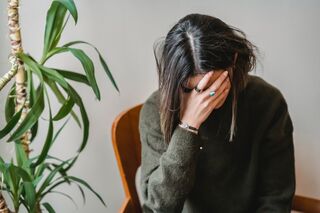Anxiety
Three Ways to Harness the Power of Anxiety
Employing anxiety for good is possible by learning how to harness its power.
Posted March 16, 2022 Reviewed by Davia Sills
Key points
- How we respond to anxiety determines whether it will wreak havoc or enhance our lives.
- Anxiety is like nuclear energy: Both are tremendously powerful forces that have an immense magnitude of effect.
- Employing anxiety for good may be easier than you think if you can learn to harness it.

Anxiety is like nuclear energy. Both are tremendously powerful forces that have an immense magnitude of effect.
Left without checks and balances, they wreak havoc. Nuclear disasters and warfare yield unspeakable destruction. Similarly, the deleterious impact of significant anxiety on physical health, economics, politics, and pretty much every other area of life is abundantly clear in the modern day.
However, the opposite is also true: When we channel nuclear energy productively, entire cities can benefit from the electrical supply, and medical technologies can curtail the progression of deadly diseases (e.g., by targeting cancer cells).
Anxiety is the same. We can utilize anxiety for good. Anxiety can provide us with the motivation and ability to enhance our relationships with ourselves and others, and we can even grow spiritually. Like nuclear energy, the key is to use enough of our anxiety to be of benefit, without drawing so much voltage to be a detriment.
Here are three ways to harness the power of anxiety:
Employing anxiety for good may be easier than you think. Most people don’t deal with their anxiety at all until it is so high that it needs to come down a notch (or two!) in order to be useful. But, even at higher levels of anxiety, there are strategies we can use to thrive.
1. When we feel anxious, we must take the time to check in with ourselves.
It’s critical to acknowledge how we feel and prioritize self-care. Just like an early alarm system in a nuclear reactor alerts technicians that they need to examine their equipment and ensure it’s in top shape, anxiety is our body’s way of notifying us that we need to prioritize sleep, exercise, and a healthy diet.
In my clinical practice, I tell almost all of my anxious patients to get 7-9 hours of sleep per night for at least 2-3 weeks. They set a bedtime, curtail the use of electronic devices a half-hour before that bedtime, and log their daily sleep hours. I have never had a patient who did not report significant benefits from this simple strategy.
2. Anxiety is an internal signal that we need to increase our connections with other people.
When we speak with others about our inner feelings, it draws us closer to them and deepens our relationship with them. Of course, we don’t need to have tearful conversations with everyone, but it is critical to open up to someone about our feelings (e.g., friend, relative, or therapist).
Several years ago, I participated in a Harvard College panel on mental health alongside the director of the Harvard counseling center. I will never forget what I learned that night: The number-one predictor of a student thriving academically and otherwise is having at least one person to speak to about how they truly feel inside.
3. Anxiety can enhance our lives spiritually by reminding us to be humble.
Psychological science has revealed that the root of anxiety is intolerance of uncertainty—the inability to accept that some things in life are beyond our knowledge and control. Along these lines, when we accept the fact that uncertainty and a limited scope of control are part and parcel of the human experience, we simultaneously become less anxious and more aware of our small stature in the universe.
One of my current patients recently related to me that overcoming her panic disorder was “the most spiritually uplifting experience” she’s ever had. Initially, I thought this was odd since she did not look elated or even happy during our sessions—in fact, she shared with me that facing her panic and accepting it was one of the hardest things she had ever done! But, when I inquired further, she clarified that as difficult as her treatment was, facing her fears enabled her to “let go” and recognize that she ultimately does not control when, where, or whether she panics. In that context, she was able to accept greater levels of uncertainty and uncontrollability in life, which left her more open to spiritual striving.
Statistically, the majority of Americans will experience clinically significant anxiety at some point during their lifetimes. How we respond to that anxiety determines whether it will wreak havoc or enhance our lives. The most important determining factor is whether we recognize that we can thrive with anxiety—once we recognize that anxiety can be a positive force, it’s infinitely easier to harness its power for good.




